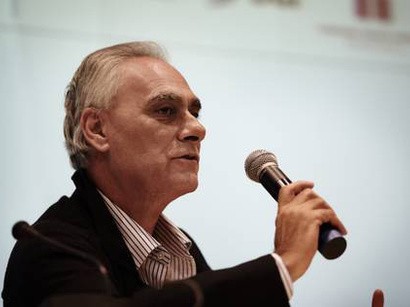By Ahmed Kadhum Fahad
NASIRIYAH, Iraq: The level of education in Iraq has been declining as a result of 30 years of war and UN sanctions. Once renowned in the region for its advanced education system and 100 percent literacy rate in the late 1970s, Iraq is now far behind most other countries in the Middle East. After 2003, the system worsened due to instability, lack of security and sectarian clashes. Many university professors have either been killed or fled the country.
There are, however, some indications that Iraqi education can be revived. The Iraq Education Initiative Scholarship Program (IEI) provides Iraqis with that hope. It is a national initiative that aims to send thousands of Iraqi students to study abroad at well-known universities in the United States and the UK.
Starting out as a pilot project in 2010, the IEI sent approximately 500 Iraqi students abroad to study. This year, 1,000 students are getting ready to enroll in US and British universities, where they will be encouraged to study those subjects that would serve Iraq best — such as engineering, economic development, education, law and urban planning.
Students from across the country are encouraged to apply and individuals from each province are selected based on their academic achievements. This program hopes to equip students with the knowledge they need to come back to Iraq and revitalize its education system. It will also allow these students — then job-ready candidates who commit to returning to Iraq following their studies abroad — to find work in Iraq’s public institutions, especially the service-provision agencies that have been damaged in previous wars.
The launch of the initiative will bring Iraqi academics in direct contact with their counterparts in the West, particularly in the United States and UK, to help enhance cultural understanding.
Iraq needs to reintegrate into the world after decades of isolation under former President Saddam Hussein’s 24-year rule. “We have been isolated for a long time. We want to know the opportunities outside in the world,” says Ziyad Al Timimi, a student who will pursue a PhD in education in the United States as part of this program.
The program has been described as a bold course of action, initiated by Prime Minister Nouri Al-Maliki, and is an indication that Iraq is now moving toward stability. It also sends the message that the government is focusing on important aspects of rebuilding beyond security. Dr. Zuhair Humadi, Director of the Higher Committee of Education Development (HCED), which is part of the office of the prime minister and which funds the IEI, believes that “education is the key to development and progress in any society.”
I recently attended a speech to a group of selected students in which Humadi reminded us that Iraq was founded in the 1960s by people who were just returning from US and UK universities with BA, MA and PhD degrees. The government is investing in education, which will in turn be an investment in the manpower necessary for positive change.
Many US and UK universities have welcomed this initiative, facilitating the placement of Iraqi students. In an attempt to show that the United States is committed to Iraq on all levels, and not only security, the US Embassy in Baghdad has offered its full support of the program.
The embassy works with the Academy of Education Development (AED), an independent non-profit organization committed to solving critical social problems around the world through education. To help HCED accomplish its goals AED has trained its staff on the differences in international education systems in order to place Iraqi students in the appropriate programs at the right US universities. The US Embassy also helps by issuing student visas to Iraqi students.
Participating students are very optimist that this initiative is what is needed to help Iraqi education achieve the status that it once had in the region — and in the world. They also see it as an avenue to advance their education and return to Iraq, fully equipped with the tools and skills to serve their country, with a renewed sense of cooperation with the outside world.
Ahmed Kadhum Fahad is an instructor at the Department of Media, College of Art with the University of Thi Qar in Nasiriyah, Iraq. This article was written for the Common Ground News Service (CGNews), www.commongroundnews.org.


